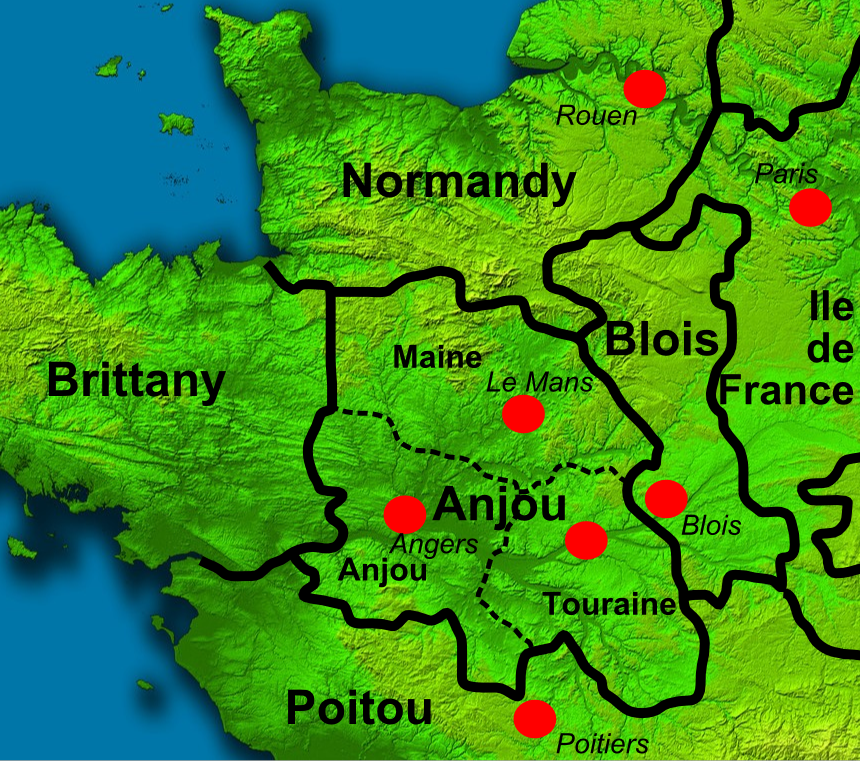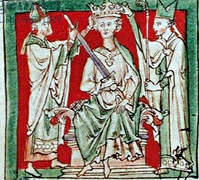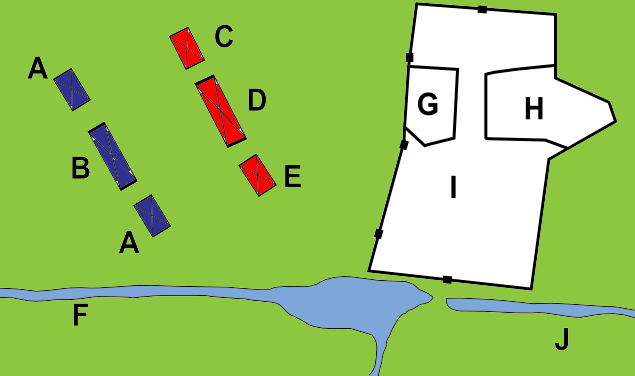|
1141
Year 1141 ( MCXLI) was a common year starting on Wednesday (link will display the full calendar) of the Julian calendar. Events * February 2 – The Anarchy in the Kingdom of England – Battle of Lincoln: Robert, 1st Earl of Gloucester and Empress Matilda wrest control of the throne of England from King Stephen, who is captured and imprisoned. * February 13 – Géza II is crowned King of Hungary and Croatia at age 11, succeeding his father. * May 14 – Sephardi Jewish philosopher Judah Halevi sets off from Alexandria on a pilgrimage to Palestine. * September 9 – Battle of Qatwan: Yelü Dashi, founder of the Qara Khitai, defeats the Seljuk Empire and Kara-Khanid Khanate, Kara-Khanid forces. * September 14 – The Anarchy in the Kingdom of England – Rout of Winchester: Empress Matilda returns to the throne, after Robert is captured by loyalist forces. * November 1 – The Anarchy in the Kingdom of England – Robert, 1st Earl of Glouce ... [...More Info...] [...Related Items...] OR: [Wikipedia] [Google] [Baidu] |
Stephen Of England
Stephen (1092 or 1096 – 25 October 1154), often referred to as Stephen of Blois, was King of England from 22 December 1135 to his death in 1154. He was Count of Boulogne '' jure uxoris'' from 1125 until 1147 and Duke of Normandy from 1135 until 1144. His reign was marked by the Anarchy, a civil war with his cousin and rival, the Empress Matilda, whose son, Henry II, succeeded Stephen as the first of the Angevin kings of England. Stephen was born in the County of Blois in central France as the fourth son of Stephen-Henry, Count of Blois, and Adela, daughter of William the Conqueror. His father died while Stephen was still young, and he was brought up by his mother. Placed into the court of his uncle Henry I of England, Stephen rose in prominence and was granted extensive lands. He married Matilda of Boulogne, inheriting additional estates in Kent and Boulogne that made the couple one of the wealthiest in England. Stephen narrowly escaped drowning with Henry I's son, William ... [...More Info...] [...Related Items...] OR: [Wikipedia] [Google] [Baidu] |
The Anarchy
The Anarchy was a civil war in England and Normandy between 1138 and 1153, which resulted in a widespread breakdown in law and order. The conflict was a war of succession precipitated by the accidental death of William Adelin, the only legitimate son of King Henry I, who drowned in the sinking of the ''White Ship'' in 1120. Henry sought to be succeeded by his daughter, known as Empress Matilda, but was only partially successful in convincing the nobility to support her. On Henry's death in 1135, his nephew Stephen of Blois seized the throne, with the help of Stephen's brother Henry of Blois, who was the bishop of Winchester. Stephen's early reign saw fierce fighting with disloyal English barons, rebellious Welsh leaders, and Scottish invaders. Following a major rebellion in the south-west of England, Matilda invaded in 1139 with the help of her half-brother Robert of Gloucester. In the initial years of civil war, neither side was able to achieve a decisive advantage; the ... [...More Info...] [...Related Items...] OR: [Wikipedia] [Google] [Baidu] |
Empress Matilda
Empress Matilda ( 7 February 110210 September 1167), also known as the Empress Maude, was one of the claimants to the English throne during the civil war known as the Anarchy. The daughter of King Henry I of England, she moved to Germany as a child when she married the future Holy Roman Emperor Henry V. She travelled with her husband to Italy in 1116, was controversially crowned in St Peter's Basilica, and acted as the imperial regent in Italy. Matilda and Henry V had no children, and when he died in 1125, the imperial crown was claimed by his rival Lothair of Supplinburg. Matilda's younger and only full brother, William Adelin, died in the ''White Ship'' disaster of 1120, leaving Matilda's father and realm facing a potential succession crisis. On Emperor Henry V's death, Matilda was recalled to Normandy by her father, who arranged for her to marry Geoffrey of Anjou to form an alliance to protect his southern borders. Henry I had no further legitimate children and nominated ... [...More Info...] [...Related Items...] OR: [Wikipedia] [Google] [Baidu] |
Judah Halevi
Judah Halevi (also Yehuda Halevi or ha-Levi; he, יהודה הלוי and Judah ben Shmuel Halevi ; ar, يهوذا اللاوي ''Yahuḏa al-Lāwī''; 1075 – 1141) was a Spanish Jewish physician, poet and philosopher. He was born in Spain, either in Toledo or Tudela, in 1075 or 1086, and died shortly after arriving in the Holy Land in 1141, at that point the Crusader Kingdom of Jerusalem. Halevi is considered one of the greatest Hebrew poets, celebrated both for his religious and secular poems, many of which appear in present-day liturgy. His greatest philosophical work was the '' Sefer ha-Kuzari''. Biography Convention suggests that Judah ben Shmuel Halevi was born in Toledo, Spain in 1075. He often described himself as coming from Christian territory. Alfonso the Battler conquered Tudela in 1119; Toledo was conquered by Alfonso VI from the Muslims in Halevi's childhood (1086). As a youth, he seems to have gone to Granada, the main centre of Jewish literary and intel ... [...More Info...] [...Related Items...] OR: [Wikipedia] [Google] [Baidu] |
Battle Of Qatwan
The Battle of Qatwan () was fought in September 1141 between the Qara Khitai (Western Liao dynasty) and the Great Seljuq Empire, Seljuq Empire and its vassal-state the Kara-Khanid Khanate. The Seljuqs were decisively defeated, which signalled the beginning of the end of the Great Seljuk Empire.''Journal of Central Asia", Vol. 16, (Centre for the Study of the Civilizations of Central Asia, 1993), 19. Background The Khitan people, Khitans were people of the Liao dynasty who moved west from Northern China when the Jin dynasty (1115–1234), Jin dynasty invaded and destroyed the Liao dynasty in 1125. Liao remnants were led by Yelü Dashi who took the Eastern Karakhanid capital of Balasagun. In 1137, they defeated the Western Karakhanids, a vassal of the Seljuks, at Khujand, and the Karakhanid ruler Mahmud II appealed to his Seljuk overlord Ahmed Sanjar for protection. In 1141, Sanjar with his army arrived in Samarkand. The Kara-Khitans, who were invited by the Khwarazmian dynasty, Kh ... [...More Info...] [...Related Items...] OR: [Wikipedia] [Google] [Baidu] |
Rout Of Winchester
In the Rout of Winchester (14 September 1141) the army of imprisoned King Stephen of England, led by his wife, Queen Matilda of Boulogne, Stephen's brother Bishop Henry of Blois, and William of Ypres, faced the army of Stephen's cousin Empress Matilda, whose forces were commanded by her half-brother Earl Robert of Gloucester. After Empress Matilda's army besieged a castle on the edge of Winchester, Queen Matilda's army arrived and blockaded the Angevin army within the city. Cut off from supplies, the Angevin army gave up the siege, then was crushed as it began to retreat. Robert of Gloucester was captured and was subsequently exchanged for Stephen, who was returned to the throne of England. However, the civil war known as The Anarchy dragged on with neither side gaining an advantage. Background Stephen usurps the throne When William Adelin drowned in the ''White Ship'', King Henry I of England was left with no male heirs. A second marriage to 18-year-old Adeliza of Louvain ... [...More Info...] [...Related Items...] OR: [Wikipedia] [Google] [Baidu] |
Battle Of Lincoln (1141)
The Battle of Lincoln, or the First Battle of Lincoln, occurred on 2 February 1141 in Lincoln, England between King Stephen of England and forces loyal to Empress Matilda. Stephen was captured during the battle, imprisoned, and effectively deposed while Matilda ruled for a short time. Account The forces of King Stephen of England had been besieging Lincoln Castle but were themselves attacked by a relief force loyal to Empress Matilda and commanded by Robert, 1st Earl of Gloucester, Matilda's half-brother. The Angevin army consisted of the divisions of Robert's men, those of Ranulf, Earl of Chester and those disinherited by Stephen, while on the flank was a mass of Welsh troops led by Madog ap Maredudd, Lord of Powys, and Cadwaladr ap Gruffydd. Cadwaladr was the brother of Owain, King of Gwynedd, but Owain did not support any side in the Anarchy. Stephen's force included William of Ypres; Simon of Senlis; Gilbert of Hertford; William of Aumale, Alan of Richmond and Hu ... [...More Info...] [...Related Items...] OR: [Wikipedia] [Google] [Baidu] |
Géza II Of Hungary
Géza II ( hu, II. Géza; hr, Gejza II; sk, Gejza II; 113031 May 1162) was King of Hungary and Croatia from 1141 to 1162. He was the oldest son of Béla the Blind and his wife, Helena of Serbia. When his father died, Géza was still a child and he started ruling under the guardianship of his mother and her brother, Beloš. A pretender to the throne, Boris Kalamanos, who had already claimed Hungary during Béla the Blind's reign, temporarily captured Pressburg (now Bratislava in Slovakia) with the assistance of German mercenaries in early 1146. In retaliation, Géza, who came of age in the same year, invaded Austria and routed Henry Jasomirgott, Margrave of Austria, in the Battle of the Fischa. Although the German–Hungarian relations remained tense, no major confrontations occurred when the German crusaders marched through Hungary in June 1147. Two months later, Louis VII of France and his crusaders arrived, along with Boris Kalamanos who attempted to take advantage of the cr ... [...More Info...] [...Related Items...] OR: [Wikipedia] [Google] [Baidu] |
Jin Dynasty (1115–1234)
The Jin dynasty (, ; ) or Jin State (; Jurchen: Anchun Gurun), officially known as the Great Jin (), was an imperial dynasty of China that existed between 1115 and 1234. Its name is sometimes written as Kin, Jurchen Jin, Jinn, or Chin in English to differentiate it from an earlier Jìn dynasty whose name is rendered identically in Hanyu Pinyin without the tone marking. It is also sometimes called the "Jurchen dynasty" or the "Jurchen Jin", because members of the ruling Wanyan clan were of Jurchen descent. The Jin emerged from Wanyan Aguda's rebellion against the Liao dynasty (916–1125), which held sway over northern China until the nascent Jin drove the Liao to the Western Regions, where they became known in historiography as the Western Liao. After vanquishing the Liao, the Jin launched a century-long campaign against the Han-led Song dynasty (960–1279), which was based in southern China. Over the course of their rule, the ethnic Jurchen emperors of the Jin dynas ... [...More Info...] [...Related Items...] OR: [Wikipedia] [Google] [Baidu] |
Kara-Khanid Khanate
The Kara-Khanid Khanate (; ), also known as the Karakhanids, Qarakhanids, Ilek Khanids or the Afrasiabids (), was a Turkic khanate that ruled Central Asia in the 9th through the early 13th century. The dynastic names of Karakhanids and Ilek Khanids refer to royal titles with Kara Khagan being the most important Turkic title up until the end of the dynasty. The Khanate conquered Transoxiana in Central Asia and ruled it between 999 and 1211. Their arrival in Transoxiana signaled a definitive shift from Iranian to Turkic predominance in Central Asia, yet the Kara-khanids gradually assimilated the Perso-Arab Muslim culture, while retaining some of their native Turkic culture. The capitals of the Kara-Khanid Khanate included Kashgar, Balasagun, Uzgen and Samarkand. In the 1040s, the Khanate split into the Eastern and Western Khanates. In the late 11th century, they came under the suzerainty of the Seljuk Empire, followed by the Qara Khitai (Western Liao dynasty) in the mid-1 ... [...More Info...] [...Related Items...] OR: [Wikipedia] [Google] [Baidu] |
Seljuk Empire
The Great Seljuk Empire, or the Seljuk Empire was a high medieval, culturally Turco-Persian tradition, Turko-Persian, Sunni Islam, Sunni Muslim empire, founded and ruled by the Qiniq (tribe), Qïnïq branch of Oghuz Turks. It spanned a total area of from Anatolia and the Levant in the west to the Hindu Kush in the east, and from Central Asia in the north to the Persian Gulf in the south. The Seljuk Empire was founded in 1037 by Tughril (990–1063) and his brother Chaghri Beg, Chaghri (989–1060), both of whom co-ruled over its territories; there are indications that the Seljuk leadership otherwise functioned as a triumvirate and thus included Seljuk dynasty, Musa Yabghu, the uncle of the aforementioned two. From their homelands near the Aral Sea, the Seljuks advanced first into Greater Khorasan, Khorasan and into the Iranian plateau, Iranian mainland, where they would become largely based as a Persianate society. They then moved west to conquer Baghdad, filling up the power va ... [...More Info...] [...Related Items...] OR: [Wikipedia] [Google] [Baidu] |
Yelü Dashi
Yelü Dashi (; alternatively ), courtesy name Zhongde (), also known by his temple name as the Emperor Dezong of Western Liao (), was the founder of the Western Liao dynasty (Qara Khitai). He initially ruled as king from 1124 to 1132, then as emperor from 1132 to 1143. He was also known in Muslim sources as Nūshī Taifū, Qushqin Taifū or Qushqīn, son of Baighū. He fled the Liao dynasty in northern China as it was on the verge of destruction by the Jurchen-led Jin dynasty and moved westward into Central Asia where he established a new empire. Name There are various theories regarding his name. According to Sugiyama Masaaki, Dashi (大石) might be a borrowing from Chinese title ''taishi'' (太師). '' Qidan Guo Zhi'' suggests was just a nickname. Early life Yelü Dashi was a minor member of the Liao dynasty's imperial Yelü clan and an eighth generation descendant of the Emperor Taizu of Liao. His date of birth is not entirely clear but may have been in either 1087 or ... [...More Info...] [...Related Items...] OR: [Wikipedia] [Google] [Baidu] |







